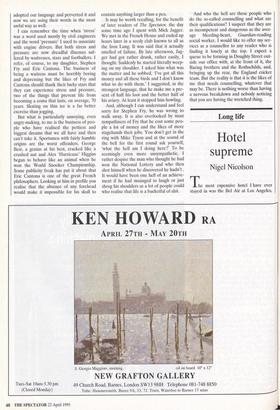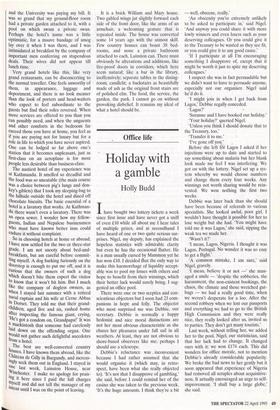Long life
Hotel supreme
Nigel Nicolson
The most expensive hotel I have ever stayed in was the Bel Air at Los Angeles, and the University was paying my bill. It was so grand that my ground-floor room had a private garden attached to it, with a pool on which swam a private swan. Perhaps the hotel's name was a little optimistic, for a mauve bandage of smog lay over it when I was there, and I was intimidated at breakfast by the company of important men conferring on stupendous deals. Their wives did not appear till lunch time.
Very grand hotels like this, like very grand restaurants, can be disconcerting to the normal traveller. One feels unworthy of them, in appearance, luggage and deportment, and there is no look meaner than the look of porters and head-waiters who expect to feel subordinate to the guests but find their roles reversed. When more services are offered to you than you can possibly need, and when the unguents and other comforts in the bedroom far exceed those you have at home, you feel as if you are paying not for luxury but for a role in life to which you have never aspired. One can be lodged so far above one's station that it becomes unpleasant, just as first-class on an aeroplane is for most people less desirable than business-class.
The nastiest hotel of my experience was at Kathmandu. It smelled so dreadful and the food was so uneatable (the main course was a choice between pig's lungs and don- key's giblets) that I took my sleeping-bag to the hillside outside the hotel and dined off chocolate biscuits. The basic essential of a hotel is a lavatory that works. At Kathman- du there wasn't even a lavatory. There was an open sewer. I wonder how my fellow- guests, Indian and Nepalese businessmen who must have known better inns could endure it without complaint. So in choosing hotels at home or abroad, I have now settled for the two or three-star grade. I am not snooty about bed-and- breakfasts, but am careful before commit- ting myself. A dog barking furiously on the doorstep is enough to put me off, and it is curious that the owners of such a dog Which doesn't bite them expect the visitor to know that it won't bit him. But I much like the company of dogless owners, as when I stayed last summer with a retired naval captain and his wife at Cerne Abbas in Dorset. They told me that their grand- children, aged five and six, rushed home after inspecting the famous giant, crying, He's got a condom on, Grandpapa!' It was a mackintosh that someone had carelessly laid down on the offending organ. One would not gather such delightful anecdotes from a hotel.
, The best are well-converted country houses. I have known them abroad, like the Chateau de Gilly in Burgundy, and increas- ingly seek them out in England. I stayed in one last week, Lainston House, near Winchester. I make no apology for prais- ing it here since I paid the full charges myself and did not tell the manager of my intent until I was on the point of leaving. It is a brick William and Mary house. Two gabled wings jut slightly forward each side of the front door, like the arms of an armchair, a welcoming gesture that is repeated inside. The house was converted some 14 years ago with the utmost skill. Few country houses can boast 38 bed- rooms, and none a private bathroom attached to each. Lainston can. There must obviously be alterations and additions, like fire-proof doors in corridors, which here seem natural; like a bar in the library, inoffensively; separate tables in the dining- room, candlelit; a backstairs as beautifully made of ash as the original front stairs are of polished elm. The food, the service, the garden, the park. I cannot go on without provoking disbelief. It remains my ideal of what a hotel should be.



























































 Previous page
Previous page